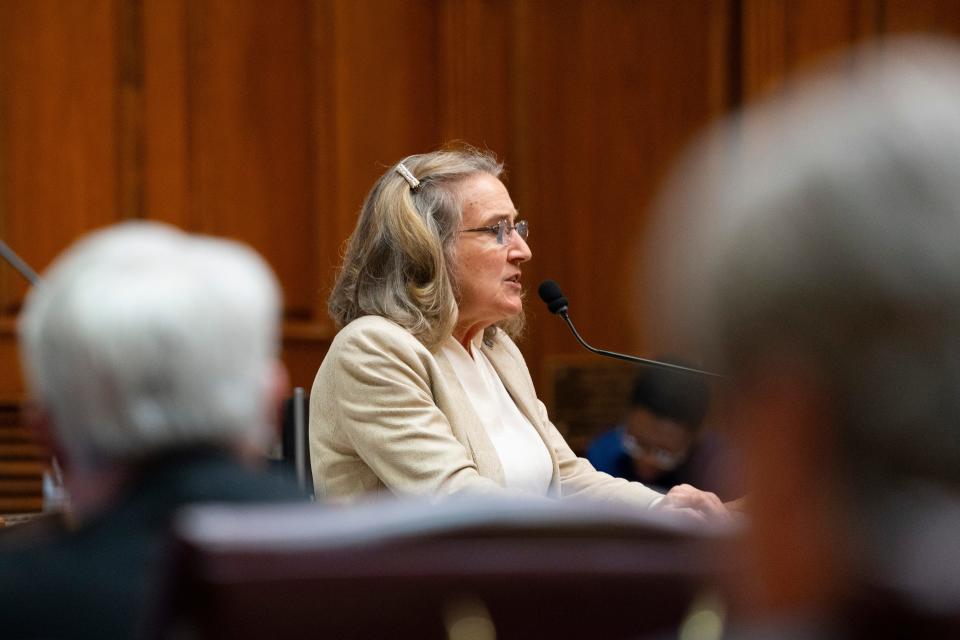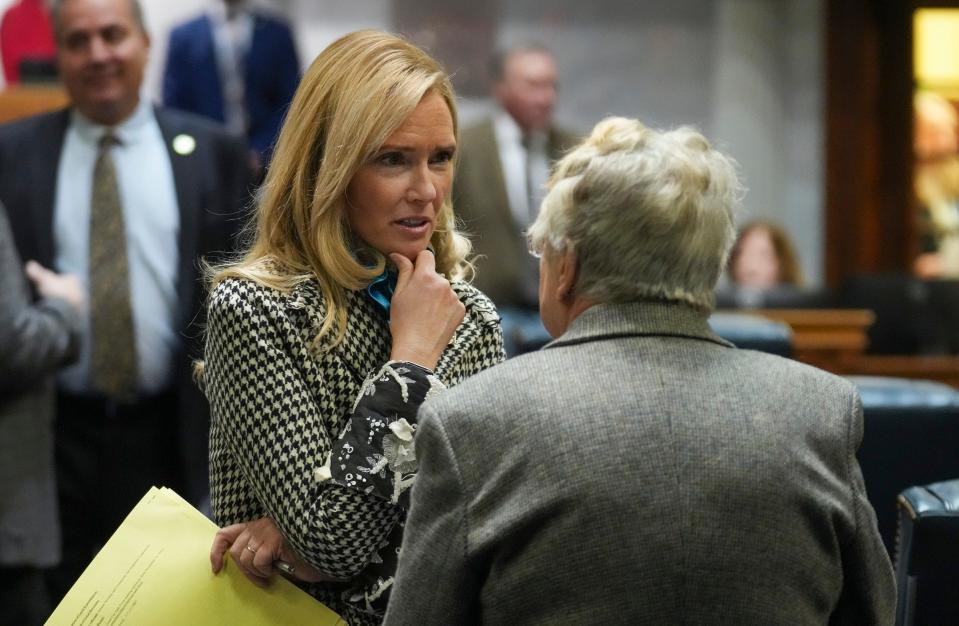A Statehouse fight over birth control shows how divided Indiana is on reproductive issues
Just days before the end of the 2024 legislative session, nearly every Senate Democrat voted against a birth control bill championed by a member of their own party across the hall at the Statehouse. One by one, eight of the nine names changed to red on the voting board.
House Bill 1426 carried by Rep. Rita Fleming, D-Jeffersonville, requires hospitals to offer women on Medicaid, who have just given birth in a hospital, subdermal long acting reversible contraceptives. Gov. Eric Holcomb signed the bill into law March 12, but not before it became grounds for the latest battleground in Indiana's abortion debate.
“For some reason there are minds or people out there who are in this legislative body that believe because one party submits a piece of legislation," Senate Minority Leader Greg Taylor, D-Indianapolis said about his vote against the bill, "that their friends on the same side of the aisle have to vote for it."
Taylor’s comments marked the ending of weeks of debate on Fleming’s bill. House Bill 1426 as introduced did not specify which long acting birth control options had to be offered. But a Republican lawmaker shared in late February that Indiana Right to Life lobbied for IUDs, contraceptives placed in the uterus, to be carved out of the bill, due to unfounded claims that IUDs cause abortions.

It created a rare divide among Statehouse Democrats, which as members of the super-minority have a more challenging time passing legislation even when the party is on the same page. While lawmakers like Fleming saw the bill as an important step toward improving health and birth control access for Hoosier women who need it most, Senate Democrats saw the bill's exclusion of IUDs as a warning sign that those opposed to abortion will target birth control next.
The push and pull over the bill reflects how polarized reproductive health care continues to be in the two years since the U.S. Supreme Court struck down Roe v. Wade, and how uncommon it is for elected officials today to publicly break with the party line on the topic. Today, no Democrat in the Statehouse will support the passage of any abortion restrictions — at least not publicly.
But a decade or so ago, some of the state's most influential Democrats were anti-abortion, including former U.S. Sen. Joe Donnelly who served until 2018. Those leaders don’t necessarily fit in the party today, political watchers said.
“They do feel like the oxymoron,” said Laura Wilson, an associate professor of political science at the University of Indianapolis. “I don't think ideologically they are, but the political climate in terms of polarization makes them that way. It makes our perception black and white and there's no space for that gray area.”
The polarization among elected officials here in Indiana is reflective of the dynamics of Congress where few, if any, clear anti-abortion Democrats remain.
Meanwhile, the topic of abortion will continue to take center stage across the country. It is a central theme on the 2024 campaign trail, the U.S. Supreme Court is scheduled to hear cases on abortion pills at the end of March and the Alabama Supreme Court in February decided embryos created during in vitro fertilization are legally protected children.
How Hoosiers view reproductive care
Politicians and their stances on abortion have become a litmus test, especially in the Statehouse. Republicans who are not 100% anti-abortion can face major criticism and primary election challenges from the right wing of their party while Democrats have used it as a major campaign message, to varying levels of success.
However, Hoosier views on abortion and reproductive health care today are not exactly reflective of lawmakers at the Indiana Statehouse. According to the 2023 Hoosier Survey conducted by Ball State University’s Bowen Center for Public Affairs, the majority of Hoosiers believe there should be some form of legal abortion in the state.
Specifically about 31% of people who responded said abortion should be legal in most cases and nearly 28% said it should be legal in all cases. About 27% responded abortion should be illegal in most cases and around 10% said it should be illegal in all cases.
That means most Hoosiers' views about abortion are less black and white and more nuanced, even as state lawmakers mostly remain in their respective political corners.
In summer 2022 when the Indiana General Assembly passed the near-total abortion ban, only Republicans voted in favor of the bill. No Democrats voted for the final version of the ban while some Republicans voted to oppose it for either being too extreme or too lenient.
Fleming, the Democratic lawmaker who authored House Bill 1426, voted against the abortion ban and advocated during the special session against efforts by Republicans to remove exceptions for rape and incest. The Jeffersonville lawmaker, who was elected to the Statehouse in 2018, is a retired OB-GYN who delivered around 7,000 babies in her career.
“Imagine a child of 80 pounds having a 7-pound baby coming through her birth canal," Fleming said during floor debate in 2022. "That is inhumane. We cannot do this to our children.”
Fleming, when asked about her views on abortion and reproductive health care, said she is an advocate for mothers and babies just like she was during her medical career, phrasing that echoes some messaging of anti-abortion groups. But instead of dividing people by their views on abortion, Fleming said the focus for lawmakers should be on prevention and actionable steps to help women.
"My job as an obstetrician was to promote the health of mothers and babies, to care for both. They were both my patients," Fleming said. "But then I also saw the consequences of someone who had an unexpected pregnancy. Sometimes that's a welcome addition, sometimes it is a real time of crisis. So if we could focus more on prevention, and, that means good education, especially for young people, appropriate for their age, and making birth control, widely available, reasonably priced, and continue to make it safe, maybe we wouldn't have to have all of these arguments."
Following her retirement as an OB-GYN in 2020, Fleming said she focused her action in the Statehouse on helping Hoosiers facing similar dilemmas as her former patients. One example was a 2022 bill from Fleming that prevents pregnant prison inmates from being shackled while they are in labor, which Holcomb signed into law.
From 2022: Legislation aimed at protecting pregnant inmates during childbirth passes Indiana House
But other groups said they wished Fleming would have sounded more alarm bells about IUDs being removed from this year's birth control bill. Sen. Shelli Yoder, D-Bloomington, who fought to add IUDs back into House Bill 1426, said the bill is not progress for Hoosier women on reproductive healthcare. Women, even women on Medicaid, deserve access to all scientific and medical options for birth control, she said.
"That bill sends a message that we're mandating subdermals in the state of Indiana when it comes to what we're going to offer women postpartum," Yoder said.

Ahead of the bill's final approval in the House, Fleming advocated for proactive, not political steps on contraception. Fleming said her bill takes steps to address the state’s "shameful" maternal health statistics and the bipartisan support for House Bill 1426 tried to address the prevention issue she believes was missed during debate in 2022 on the state’s abortion law.
“There's a very simple fact that if you're not pregnant, you're not going to get an abortion,” she said in early March. “Everybody can agree on that. So let's work at the front end where it's doable, where we can get consensus, and that's why (House Bill 1426) did get bipartisan support.”
Democrats and the superminority
When former Speaker John Gregg held the gavel as leader of the Indiana House Democrats, it was a different political world in the state. Gregg, who served as Speaker from 1996 to 2003 and ran as the Democratic nominee for governor in 2012 and 2016, was anti-abortion.
At the national level, the evolution behind the politics of abortion has followed a similar trend. In 1973, when the U.S. Supreme Court issued the Roe v. Wade decision, abortion was not the divisive political issue we see today. A 49-50 U.S. Senate vote in 1983 aiming to overturn Roe failed to reach the two-thirds threshold to pass, but 15 Democrats joined Republicans in favor of overturning the court's decision while 19 Republicans joined Democrats in opposition. Decades later in 2022, the only Senate Democrat left to vote against codifying Roe v. Wade was West Virginia Sen. Joe Manchin. He then supported a similar bill in 2024.
But some of today’s most polarizing issues for the major political parties in Indiana were not the black and white splits they are today, Gregg said.
“So much changed,” Gregg explained. “When I was there, you had pro-business Democrats. Today, you don't have as much. You had Republicans concerned about the environment back then. A lot of those positions like that caused some give and take and support back and forth, have just eroded because the base of the parties don't want any of that."
There are still spaces available in the Democratic party for moderates on reproductive health care if you can get elected, especially in more rural parts of the state, Gregg said. Fleming, for example, is one of few Democrats in southern Indiana, and won a close Statehouse race in 2022. Former President Donald Trump in 2020 won Clark County, where Fleming resides, by 16 percentage points.
But anti-abortion Democrats, like Gregg and Donnelly, who won elections in Indiana years ago, are not prominent figures anymore. Donnelly, now the U.S. Ambassador to the Holy See, voted to ban abortion after 20 weeks of pregnancy when he represented Hoosiers in Congress. He faced criticism for his views from both anti-abortion and abortion rights groups, before he lost his reelection bid in 2018.
Ann DeLaney, a former chair of the state Democratic Party, said Donnelly was out of touch with the Democrats on abortion. The issue has evolved for the party in the same way Democratic politicians’ positions on gay rights changed over time, which involved listening to people and learning about how it affects them, she said.
“It really brings the issue home," DeLaney said. "I think that and the entire women’s rights movement has helped to evolve the way the party approaches the issue of reproductive freedom."
But the challenge in the Statehouse is that Democrats do not have the numbers to move their priorities without help from Republicans, said Wilson from the University of Indianapolis. Democrats arguing against Democratic bills feels almost “counterproductive” to the party’s larger challenges in the General Assembly, she said.
“It's the warped world of a supermajority and a super minority,” Wilson said. “The regular rules of the game don't matter. They don't exist in the same way."
And a supermajority at the Statehouse creates an environment where gerrymandering leads to safe elections for the party in power, and then outside groups, like Right to Life this year, can influence lawmaking, said Marjorie Hershey, a professor emeritus of political science at Indiana University.

That can happen whether it's a Republican supermajority in Indiana or a Democratic supermajority in Illinois, Hershey said.
"In both of those cases," she said, "they're undoubtedly distorting the representation process because they're going further to the right or the left, than those constituents who are gerrymandered out of having a voice would like."
With a Republican supermajority at the Statehouse, Gregg said it might be worth it for Democrats to work across the aisle to make progress, like Fleming did. Other groups view that as a losing situation. Yoder said the party should be “in protection mode” on reproductive freedom issues right now.
Fleming’s bill sunsets at the end of June 2025 and lawmakers are expected to further discuss policy and costs as they create the next state budget in 2025. That means the contraceptive debate and struggle over progress on reproductive healthcare is likely to return to the Statehouse next year.
“It’s so frustrating to me to see this argument, on the left fighting against this and people on the right fighting against this,” Rep. Cindy Ledbetter, R-Newburgh, a coauthor on House Bill 1426, said in a February Senate committee hearing on the bill. “This is good legislation for women. Sometimes things have to be moved one step at a time.”
Contact IndyStar's state government and politics reporter Brittany Carloni at [email protected] or 317-779-4468. Follow her on Twitter/X@CarloniBrittany.
This article originally appeared on Indianapolis Star: How an Indiana birth control bill shows the polarization of abortion